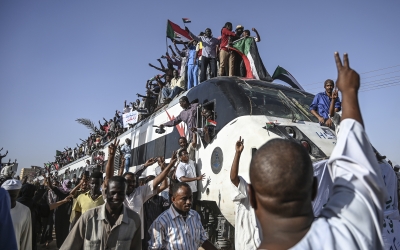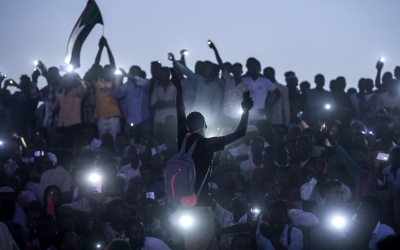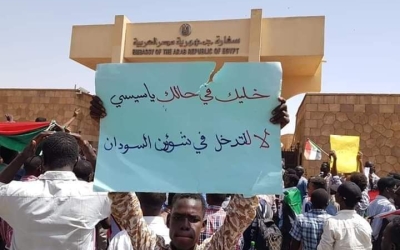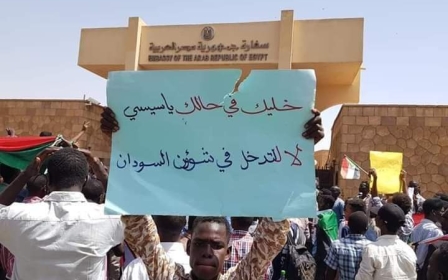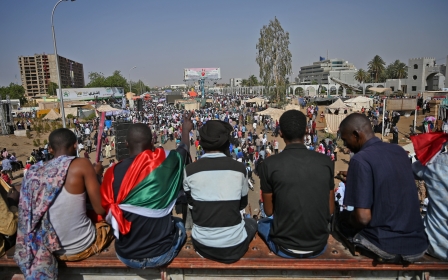Sudan protest leaders, army rulers agree on joint civilian-military council

Sudan's protest leaders and army rulers have agreed to establish a joint civilian-military ruling council, in a major breakthrough in talks between the two sides over demonstrators' demands for a handover to civilian rule.
The new council will be the sovereign ruling body that will then form a transitional civilian administration.
Saturday's agreement on the highly disputed issue came as thousands of protesters have remained encamped outside the military headquarters since the army ousted longtime leader Omar al-Bashir on 11 April, demanding that the army rulers step down.
"We agreed on a joint council between the civilian and the military," one of the leaders of the protest campaign, Ahmed al-Rabia, who was involved in the talks, told the AFP news agency.
"We are now in consultation about what percentage of the council should be represented by civilians and how much by the military."
Bashir was overthrown after 16 weeks of protests triggered by a deepening economic crisis. He is being held along with other former officials at Khartoum's Kobar prison.
The agreement between the two sides is a major breakthrough as the current army leaders had previously refused to hand over power to a civilian administration despite pressure from the street and the international community.
Mixed reaction
"I'm happy with the outcome of the talks. Other protesters too will be happy," said protester Ahmed Najdi, who has regularly camped outside the army complex over the past weeks. "We are still waiting for the final composition of the joint council."
However, not all protesters seemed as satisfied with the development.
"Half a revolution is the perishing of a nation," Osman Abadi, a 26-year-old sit-in security supervisor draped in a Sudanese flag told the Reuters news agency.
He said he would stay even if negotiations between army and the opposition failed.
The decision to have a joint council came during talks held since Saturday morning by a joint committee representing the current ruling military leadership and protesters.
The talks were the first such by the joint committee.
Another demonstrator, Rawan al-Fateh, said those camped out would not leave until their demands were met.
"We won't leave until we have civil rule and laws guaranteeing freedom of expression."
Buses bringing protesters kept arriving on Saturday, with hundreds of protesters coming from the eastern province of Kassala, an AFP photographer said.
Call for Sudan to join ICC
Protest leaders had previously held several rounds of inconclusive talks with the military council since Bashir was ousted.
Earlier this week, the two sides agreed to set up the joint committee to chart the way forward.
The military council has so far insisted that it has assumed power for a two-year transitional period.
Western governments have expressed support for protesters' demands, but Sudan's key Gulf Arab lenders have backed the military council, while African states have called for more time for the army to hand over to civilians.
Meanwhile, the country's top opposition leader Sadiq al-Mahdi called for Sudan to join the International Criminal Court, which has indicted Bashir.
He said his party would not join a civilian transitional government, but insisted Sudan should "immediately" join the Hague-based International Criminal Court, where Bashir is wanted for genocide, war crimes and crimes against humanity for his alleged role in the conflict in Darfur.
Bashir, 75, has consistently denied the charges against him.
President's followers clinging on
The war in Darfur erupted in 2003 when ethnic minority rebels took up arms against Khartoum's Arab-dominated government, accusing it of social and political marginalisation.
The United Nations says about 300,000 people have died in the conflict, with another 2.5 million displaced, many of them still living in miserable camps across the western region of the country.
Protest group spokesman Amjad Farid told reporters that Bashir and other former government figures could be tried in Sudan.
"We are not seeking retaliatory measures against them, but we want to rebuild our justice system to hold them accountable for their crimes," he said.
Mahdi, who was forced from office by Bashir in a 1989 coup, said the president's followers were still clinging on despite the upheaval.
"The toppled regime might still attempt a coup," he said, without elaborating.
Middle East Eye propose une couverture et une analyse indépendantes et incomparables du Moyen-Orient, de l’Afrique du Nord et d’autres régions du monde. Pour en savoir plus sur la reprise de ce contenu et les frais qui s’appliquent, veuillez remplir ce formulaire [en anglais]. Pour en savoir plus sur MEE, cliquez ici [en anglais].


